The Vancouver Canucks have had their share of unsung heroes throughout history. From Jannik Hansen to Alex Burrows to Derek Dorsett, it’s often complementary players who have a major impact. They are also the reason why some teams are always in the playoff race, like the Pittsburgh Penguins or Washington Capitals.
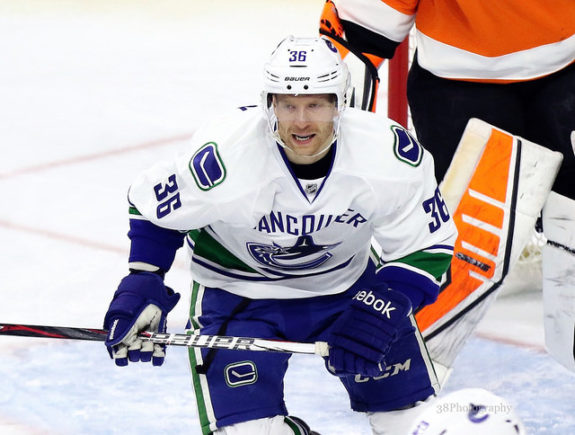
Sure, stars like Sidney Crosby and Alexander Ovechkin lead the way, but those teams have also had players like Bryan Rust or Lars Eller; players who perform consistently and can always be relied on in clutch situations.
The Canucks have an elite young core; the challenge for general manager Jim Benning is to surround Elias Pettersson, Quinn Hughes, Brock Boeser, and Bo Horvat with enough talent to push for a Stanley Cup.
Related: Longest Stanley Cup Droughts
Benning may have done just that in December 2018 when he acquired Josh Levio from the Toronto Maple Leafs in exchange for AHLer Michael Carcone. Leivo was underutilized in Toronto, often a healthy scratch under then-head coach Mike Babcock. He was a consistent performer in his limited minutes and probably should have been given more playing time.
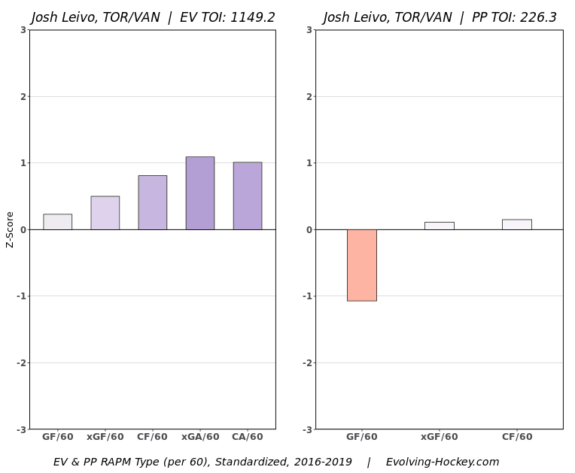
Leivo showed in limited minutes that he was a capable play-driving forward in the NHL. He just needed a bigger opportunity, and the Canucks were able to provide that.
As a pending unrestricted free agent, the Canucks have a big decision to make. Leivo could be due for a raise, and with the Canucks in a cap crunch, it’s easy to see them moving on from him.
Related: Canucks Benefiting from Jake Virtanen’s Development
That said, the Canucks need someone with Leivo’s abilities. As injuries mounted down the stretch run in 2019-20, it was clear that depth scoring is still an issue, despite major steps forward from players like Jake Virtanen and Adam Gaudette. The need for value players is at an all-time high, and the Canucks have one in Leivo.
Journey to Vancouver
Leivo was on an upward trajectory after being drafted by the Maple Leafs in the third round, 86th overall in 2011.
His junior hockey production skyrocketed in draft+one and two seasons when he exploded for 73 points in the OHL. His value as a prospect rose too; considered a reach pick in 2011, NHL.com ranked him as the Maple Leafs’ ninth-best prospect in 2013. He made the jump to the AHL’s Toronto Marlies for the 2013-14 season, where he potted 23 goals and 42 points in 59 games as a rookie.
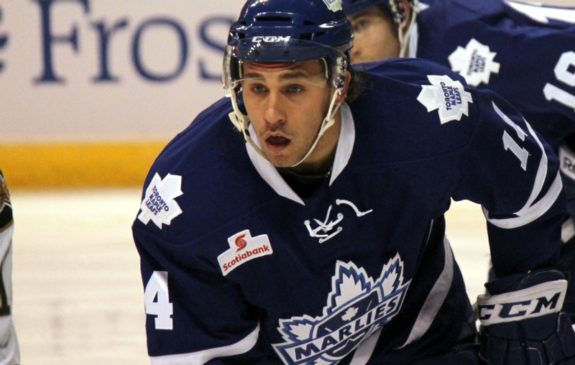
Those rookie numbers were promising. Josh Weissbock, now a prospect consulting specialist with the Florida Panthers, found that the benchmark for 19-21-year-old AHL forwards to have NHL success was .7 points-per-game (PPG). With 42 points in 50 games, Leivo’s .71 PPG put him in line with Weissbock’s findings. He had the potential to be an NHL player right from his rookie professional season.
After a cup of coffee with the big club, he returned to the AHL for the 2014-15 and 2015-16 seasons. However, his production stalled a bit in 2015, resulting in a slide down the Maple Leafs’ depth chart. After acquiring numerous future NHLers (like Mitch Marner, William Nylander, Kasperi Kapanen and Connor Brown, among others), Leivo found himself on the outside looking in.
Unfortunately, he lost his waiver eligibility after the 2015-16 season. While the Maple Leafs still liked him, there were too many talented young players coming into the lineup at the same time. Toronto didn’t want to lose Leivo on waivers, but he couldn’t crack the lineup, so he was a healthy scratch for much of the next two seasons.
Related: Worst Free Agent Signings in NHL History
Leivo signed an extension with Toronto in Nov. 2017, but by Feb. 2018, he asked for a trade. Leafs GM Kyle Dubas decided to keep him until the 2018-19 season, with the Nylander contract negotiations in full swing. However, he promised Leivo that if a potential trade was presented to him, he would make a deal. Leivo became a Vancouver Canuck on Dec. 3, 2018.
Where He Fits Now
Since joining the Canucks, Leivo has made a positive impact and looks like the player his AHL numbers suggested he would be. He’s scored 37 points in 85 games as a net positive play-driver at even strength. His addition to the middle-six has been key in boosting the forward group. Before going down to injury, he ranked third among Canucks forwards in even-strength shots differential (CF%) and sixth in expected goals percentage (xGF%).

Leivo’s performance kept pace with the first line – that’s elite company and shows he can sustain his solid play over a long period of time. Since joining the Canucks, he has continued to develop into a strong even-strength play-driver.
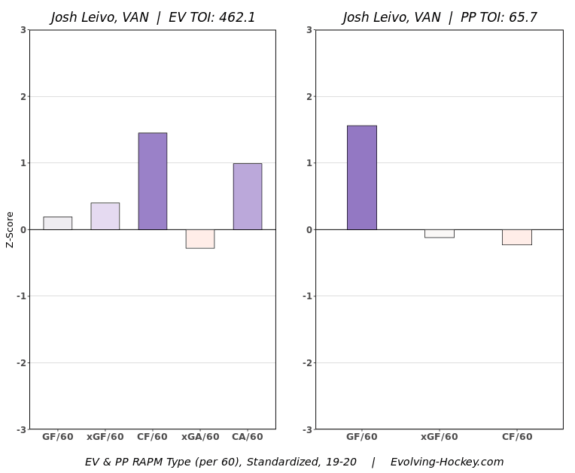
Leivo’s ability to control the puck has proved valuable; he consistently outshoots his opposition and has a positive goal differential. I consider him Tyler Toffoli-lite; he is an elite play-driver but his shooting ability is non-existent. He needs help translating his strong possession play into actual goals.
Related: Canucks’ Tyler Toffoli Linemate Options
He could plug a hole in the top-six alongside Pettersson or Horvat if needed, but his true ability is to drive the play from the third line. For this reason, I see him a permanent left-winger for Adam Gaudette and Jake Virtanen. The two youngsters generate shots, goals and scoring chances at solid rates. Where they struggle is consistently driving play and their overall defensive acumen. Leivo would be a nice fit alongside them and could provide the much-needed depth scoring the Canucks need.
Long-term Outlook
Leivo’s status as a pending unrestricted free agent puts his future in Vancouver in doubt. Adding to the complexity of the situation is the uncertainty of next season’s salary cap, the Canucks’ cap situation, and whether Leivo’s season-ending injury will play into management’s decision.
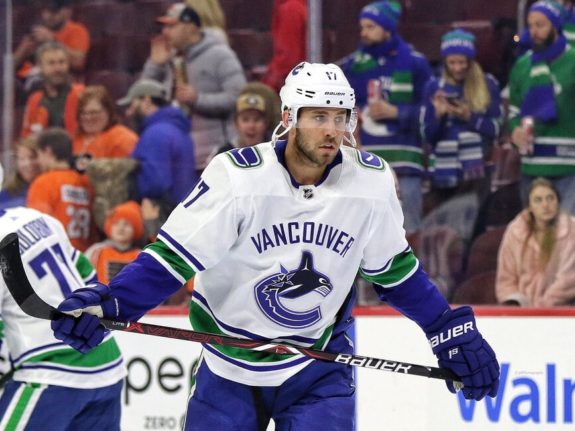
Using Evolving-Hockey’s contract projections, Leivo could be set to earn a three-year deal worth $1.856 million per year from the Canucks. That would fit in with the team’s salary structure as of now, and keeping a player like him is worth that price.
Teams need to take advantage of any value they can get. By re-signing Leivo, Vancouver would be doing just that; he would solidify the third line and give the Canucks what they’ve been looking for for years: depth. Depth is what all Stanley Cup contenders have, and if the plan is to win, Leivo is the kind of player who will help the team get there.